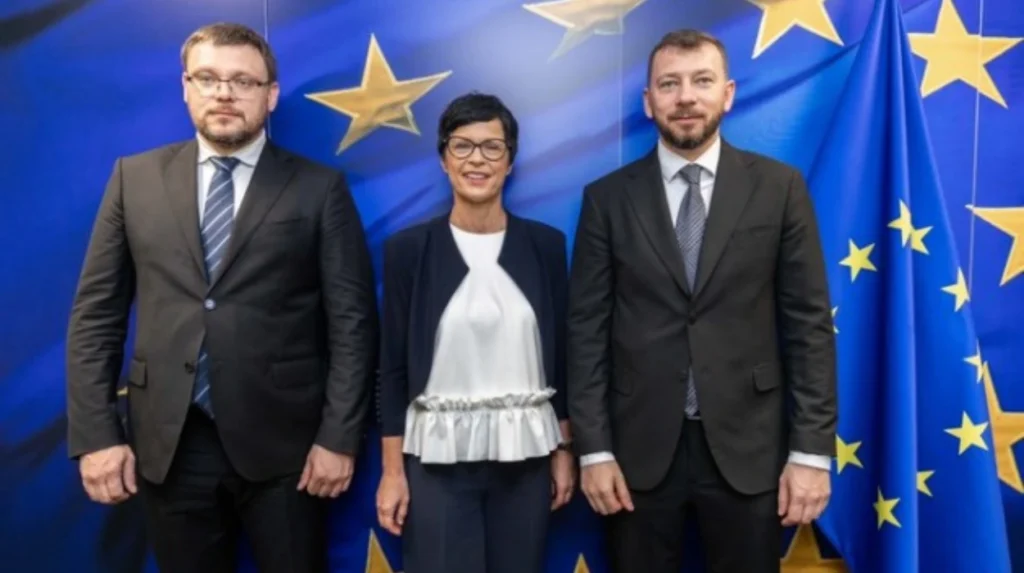European Commissioner for Enlargement Marta Kos emphasized the critical role of Ukraine’s anti-corruption fight in the country’s aspirations to join the European Union after meeting with the heads of the Specialized Anti-Corruption Prosecutor’s Office (SAPO) and the National Anti-Corruption Bureau of Ukraine (NABU). The discussions highlighted the importance of independent anti-corruption institutions as foundational pillars of the rule of law and necessary for Ukraine’s reconstruction and integration into Europe.
Background: Challenges in Ukraine’s Anti-Corruption Reform
Ukraine’s journey toward EU accession has been closely tied to its efforts to combat corruption, a persistent and systemic problem since its independence. The establishment of NABU in 2015 and SAPO in 2017 marked significant advancements in creating specialized bodies to investigate and prosecute corruption, respectively. These agencies gained international recognition for their vital role in ensuring transparency and accountability within Ukraine’s government.
However, mid-2025 saw a legislative upheaval when the Verkhovna Rada passed a bill that diminished the independence of these agencies by placing them under the supervision of the Prosecutor General, a position closely linked to political influence. This legislation sparked wide protests across Kyiv and other cities, reflecting broad public concern and the high stakes associated with preserving the autonomy of Ukraine’s anti-corruption fight. President Volodymyr Zelensky initially signed the law, citing the need to cleanse the agencies from alleged Russian influence but soon faced mounting pressure from civil society and international partners to reverse course.
Commissioner Marta Kos’s Meeting with SAPO and NABU Heads
In Brussels, Marta Kos engaged in direct talks with the leadership of SAPO and NABU, underlining the European Union’s unwavering support for their mission. She stated on social media, “Met NABU and SAPO leadership: their fight against corruption is crucial for Ukraine’s EU accession and reconstruction. I reiterate my full support to their work: independent anti-corruption bodies are the backbone of the rule of law and a sound business climate.”
The meeting took place amid ongoing efforts by President Zelensky and the Ukrainian parliament to restore the independence of these bodies. Following robust domestic demonstrations and international calls, a new draft law aimed at preserving their autonomy was finalized and passed in late July 2025. This legal reversal was widely welcomed by Brussels as an essential step to realign Ukraine’s anti-corruption framework with EU standards.
The Importance of Independence in Anti-Corruption Efforts
The operational autonomy of NABU and SAPO is central to their effectiveness. NABU handles investigations into high-level corruption, while SAPO leads prosecutions in court. These institutions must remain insulated from political interference to sustain public confidence and international credibility.
European Commissioner Kos reinforced this sentiment, emphasizing that “upholding fundamental values and fighting corruption must remain top priorities for Ukraine’s leadership.” She stressed that these institutions are “the backbone of the rule of law and a sound business climate” essential for future investments and democratic resilience.
The EU’s Role and Expectations
The European Union has made clear that Ukraine’s progress on anti-corruption reforms is a critical condition for deeper integration and access to EU funds, including extensive reconstruction aid necessitated by the ongoing conflict with Russia. EU officials have repeatedly linked financial assistance to tangible reforms maintaining transparency and judicial independence.
Kos’ meeting coincided with wider EU diplomatic activity aimed at monitoring Ukraine’s reform trajectory. Following the meeting, European Commission spokesperson Markus Lammert noted that the EU will continue to review Ukraine’s accession process, including anti-corruption benchmarks, with a focus on “summarizing interim results and next steps toward accession” in forthcoming EU Council discussions.
Domestic Reactions and Public Sentiment
Ukrainian civil society has remained vocally supportive of independent anti-corruption bodies. The protests sparked by the July 2025 legislative changes showed persistent determination to hold leaders accountable and to safeguard democratic reforms achieved since 2014.
President Zelensky, after early backing of the law reducing NABU and SAPO’s powers, signed subsequent legislation restoring their independence. He defended the initial bill as an effort to purge the agencies of “Russian influence,” asserting that many cases had been “lying dormant” for years, and vowed to ensure effective prosecution of corruption offenses without political bias. However, the reversal demonstrated responsiveness to both domestic and international concerns.
Challenges Ahead for Ukraine’s Anti-Corruption Landscape
Despite positive signals from Brussels and Kyiv, the road forward is fraught with challenges. Political pressures and vested interests continue to threaten institutional autonomy. Experts warn that legal safeguards for anti-corruption agencies must be robust and enduring to avoid relapse.
The EU’s insistence on maintaining these standards demonstrates that anti-corruption efforts are not merely domestic policy but integral to Ukraine’s geopolitical alignment and long-term stability. Commissioner Kos’s visit and her message of support highlight the high stakes involved in Ukraine’s democratic consolidation and reconstruction efforts.
Statements from European and Ukrainian Officials
Benjamin Haddad, France’s Minister Delegate for European Affairs, who also met with Ukrainian anti-corruption leaders recently, reinforced the EU’s commitment to backing Ukraine through complex reforms. He noted,
“Ukraine’s progress in this area directly reflects its democratic resilience and credibility on the international stage.”
Similarly, Ukrainian anti-corruption officials maintain a strong public stance on their mission’s vital importance. They have underlined their readiness to face political hurdles and continue enforcing transparency as fundamental to Ukraine’s EU aspirations and national future.







